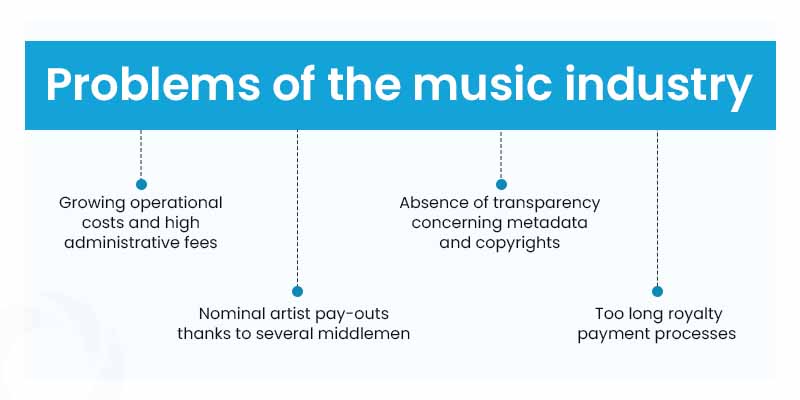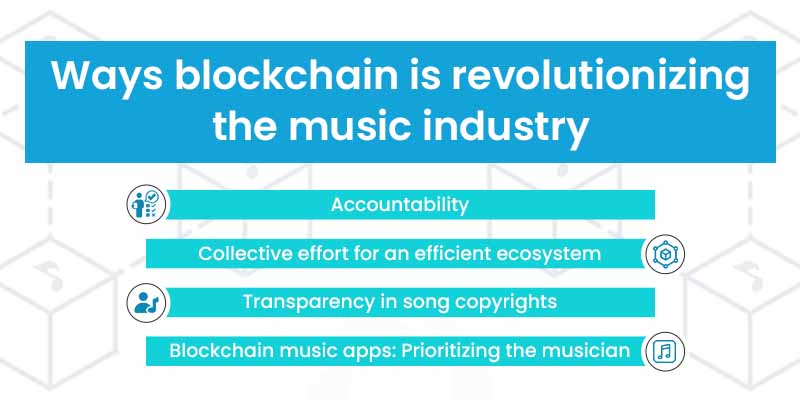Blockchain | 21 Apr 2023 | 8 min
How Blockchain Technology is Revolutionizing the Music Industry

Chances are, if you ask any musician how they feel about blockchain, they might start singing its praises! Better yet, they might compose melodious songs dedicated to it.
Now who doesn’t love a brilliant, new song?
But I digress. What’s key is that every brilliant, new song should retain its original credits. What’s more, every brilliant artist must be rewarded justly. That’s possible with blockchain.
A remarkable revenue-sharing model that gives artists their fair share of royalties instantly.
A realm of greater trust and accountability between artists and media corporations.
Yes, that’s a vision of the ideal music industry. You can almost hear the beautiful, lilting music as the background score, wouldn’t you agree?
Blockchain is a robust technology that plays a prominent role in the tracking of activities in an array of industries.
In today’s blog, the spotlight is on media and entertainment, specifically the music business. Read on!
Blockchain technology is troubleshooting some mammoth problems of the music industry, like:

Fig 1: Problems of the music industry
It’s clear that blockchain is helping us to step closer to an ideal world of music. How? Let’s explore some more.

Fig 2: Ways blockchain is revolutionizing the music industry
Imagine reliably managing and tracking multiple aspects of the media creation process. Details on a song and its contributors would be stored safe as houses. This database will lead to correct and quick royalty payments!
What happens when a shared, decentralized metadata network is crafted using blockchain? Participants across the digital media value chain can input and communicate data in a single space.
Details about songs have distinctive identifiers. Multiple parties can share this, which means data can’t really be missing or mismatched.
With blockchain, credit is allocated where it is due, based on collective effort. Let’s see what that could mean…
The truth is, rich music helps people to come together. You must have experienced this each time you find yourself bonding with friends over a soulful song!
In a similar vein, consensus is vital for a successful blockchain solution. This way, there is next to no risk of forgetting contributors and metadata being absent.
Creating a scalable network is the goal, and powerful waves of collective effort will form the perfect musical ecosystem musicians are dreaming of.
Thanks to blockchain, it can be a cakewalk for musicians to authorize and manage their music copyright on a public ledger.
Intermediaries are not involved during the process of propagation. This is a major reason why copyrights holders can receive a larger share of royalty payments from the music industry.
What’s more, the process is automated and prompt.
Watch this video to learn about Nitor Infotech’s blockchain prowess and how transparency can star in the transferring of song copyrights.
The distributed ledger technology says goodbye to copyright disputes on music as records are immutable. Embedded smart contracts ensure that every stakeholder in the music value chain (composers / musicians / producers) are compensated for their effort on time. Music would always be attributed to the original creator and owner.
You can track the metadata on blockchain for the music file and the hash of metadata is saved as a marker on the music file. This is all the data needed to pinpoint ownership as well as payment rights. As you can see, the process is simple and grounded in a single version of truth.
What’s more, blockchain-powered music sites help fans to support their favorite musicians directly. This could redefine the connection between musicians and their fan bases.
Well, all in all, it does seem that blockchain is unleashing transparency into the music industry. The road ahead has its share of challenges, but the energy of technology in music is sure to surmount them all. Let’s get set for some rather tuneful ‘blockchain music’, shall we?

Reach out to us with your comments on blockchain in music. Visit us at Nitor Infotech to discover our penchant for blockchain technology!

we'll keep you in the loop with everything that's trending in the tech world.
